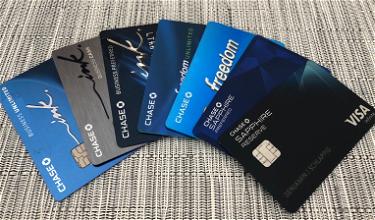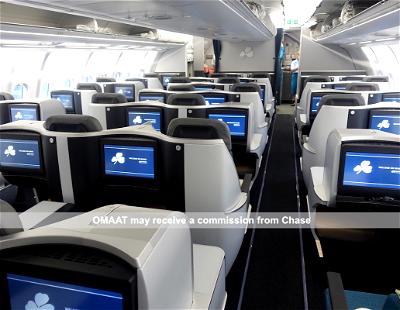While much of the blog’s focus is the impact the current pandemic is having on the travel industry, it goes without saying that a lot of industries are suffering at the moment.
Chase has published some data about how credit card spending has changed in recent weeks. This not only impacts the credit card industry as such, but also reflects how much less money is being spent in the economy otherwise.
First a bit about how this study was conducted — Chase took an anonymous sample of eight million families across all 50 states who have been active users of Chase credit cards since January 2018. They then paired credit card data with checking account data to determine income levels and industry of employment.
Below are some of the key findings of this study.
In this post:
Chase credit card spending has dropped 40%
Average household credit card spending has fallen by 40% year over year in recent weeks. The way this has played out, the 40% drop came in the second half of March, and then stabilized at that level for the first two weeks of April.
Average weekly credit card spending in April 2020 was about $300 lower than in April 2019.
Non-essential credit card spending dropped by 50%
Equally interesting is the categories in which spending has changed. When the pandemic started, spending in essential categories increased by 20% around early March, before returning to pre-pandemic levels.
Meanwhile spending in non-essential categories declined by 50% and has remained there, accounting for nearly all of the total decline in spending.
Given the stay at home orders, why were most households still spending an average of $250 per week on non-essential categories in April? The study concludes the following:
- There was variation in the degree of closures across geographies, and also variation in terms of what was deemed to be non-essential
- Households were able to switch some non-essential services from in-person to remote, like switching from movie theaters to streaming services, and switching from dining in restaurants to ordering take-out
- Spending categories do not map perfectly to each specific non-essential category
In a way what surprises me here is that essential spending hasn’t stayed higher than it was pre-pandemic. For example, I know we’re spending a lot more on groceries nowadays, as we’ve largely shifted from eating out and even ordering delivery, to just cooking at home.
Higher-income households had bigger drops in spending
This doesn’t come as a surprise, since higher income households have more disposable income, and therefore spend more on non-essential goods:
- For the bottom quarter of household incomes ($39,000 or less), weekly credit card spending decreased by $150, or 38%
- For the top quarter of household incomes ($92,000 or more), weekly credit card spending decreased by $400, or 46%
The study suggests that it’s surprising that there wasn’t a bigger drop among lower income households, given that:
- Lower income households disproportionately have jobs that are harder to perform at home, requiring more physical proximity
- Job losses were four times as high among workers in the bottom 25% of incomes than in the top 25% of incomes
- 35% of unemployment is among those with the lowest incomes
Unfortunately the sad reality is probably that those with the lowest incomes can’t cut spending as much, and will end up going into credit card debt to pay for essential purchases.
Bottom line
Chase has seen a 40% drop in spending towards the end of March and beginning of April, which is huge. The data I’ve seen about the industry on the whole suggests spending has decreased, but not quite to this extent.
It sure seems like Chase’s customer base is cutting back more on spending than with other credit card issuers. This could be because:
- Chase has lots of travel rewards cards
- Chase also has lots of premium cards, typically used by those with higher incomes, where they’re seeing the biggest drops in spending
Personally I know I’m putting a lot of spending on the Citi Double Cash® Card (review), which has no annual fee and offers an incredible amount of flexibility to earn cash back or rewards points. I think cards like this are more useful than ever before.
What do you make of this data from Chase?





Citi now offers 2.5% cash back - unbeatable at this time vs almost any points for most nonbonused spend
Screw Chase, they are so getting their paybacks. This is what happens when you try to screw over the customers who put you where you are (were...prior to COVID-19) today first with 5/24 then taking it to the extreme. Downgraded everything I had from them with an annual fee and use them only when it serves me best.
Chase has frozen my Sapphire and Freedom for "potential fraud", but all of the "potential fraud" charges are mine and valid. I have confirmed as such via email and text options provided to me, and Chase has responded that the freeze was lifted. However, the cards remain frozen. Twice I have been left at grocery store checkout trying to get cards to work, with other angry customers backing up behind me, and store workers scowling...
Chase has frozen my Sapphire and Freedom for "potential fraud", but all of the "potential fraud" charges are mine and valid. I have confirmed as such via email and text options provided to me, and Chase has responded that the freeze was lifted. However, the cards remain frozen. Twice I have been left at grocery store checkout trying to get cards to work, with other angry customers backing up behind me, and store workers scowling at me like I'm some deadbeat as they have to remove the many bags of produce and meats which they likely have to dispose of instead of restock due to the current state. The worst part is that Chase simply refuses to discuss and therefore resolve the problem. They will only give runaround.
So maybe a lot of spending reductions are forced by Chase, which seems to be more out of incompetence than any other reason.
Hidden in all this is that we were in an 11 year long expansion, the LONGEST in US history. It was fueled by credit and debt and was gonna pop at some point. No one thought it would be a virus.
But if anyone thinks, this is gonna be a "V"-shaped recovery, they are in for a surprise. We are a society whose economy runs primarily on consumption. We will feel the effects for a few years.
Amex is getting nothing from me right now as no eating out and no travel. My two biggest categories of spend currently are charitable donations and a major pool renovation that was over $20k, and it is all going on Chase cards. Without that my spending would be down sharply. No travel, no personal care, no eating out....all means a lot less spending.
I am spending just as much as always CHASE on my AMEX, CITI and other cards. CHASE is getting just rewards for their idiotic 5/24 and other rules such as approving no one with a BK on their record. Maybe their UW Dept will wake up and smell the coffee before they ask the Govt for another bailout.
@Rob - care to source your claim? I see $372 for 2019 as the National average weekly rate (per the NYT). Quite a bit different.
Mines up. More online shopping cuz I’m bored at home. And groceries have less sale now. I can’t grocery store hop and buy only things on sale at that store. I goto less stores and get it all. And they’re not on sale! Sucks.
Typically in Q1 of each year a lot of my spending would have been booking hotels, flights, and activities for my summer family trip. Thats usually a significant portion of my annual spending. Due to the pandemic we have postponed all family trips until at leas 2021 if not later. That on top of my business travel being 0 way more than offset my increased spending on Amazon for work from home tools like hair cutting kit, tools and materials for gardenint...etc.
Lower income is likely up at the moment on average. Stimulus checks plus $900/wk ($22.5/hr) to sit on your butt and do nothing. And the ones still working on getting OT and hazard pay in many places.
Yes, my spending has dropped. Other than groceries ... and I’m spoiling myself with fine food ... I’m not spending much.
But moreover, I wonder if they are taking into account refunds. So far, I’ve had $37,000 credited back for cancelled vacations this year. And in another month, I’m expecting another $24,000 vacation credit to hit.
This maybe be the first year my entire life I have not travelled internationally.
I have a JPMorgan Ritz Rewards card and an Amex Platinum card. Amex is doing a lot to offset their annual fee while Chase has not accommodate cardholders, but still charge a hefty annual fee. I reached out to customer service and was told that no accommodations would be made and that I should cancel my card if I was unhappy with their policy.
I now barely use the JP Morgan Chase. Bonvoy points and Ritz Club upgrade certificates are not a priority at this time.
My spending has dropped 75%. It's just groceries and Amazon on my bill these days. There's nothing to spend on if everything is closed and you can't travel. Our usual Chase bill is $5-10k/month.
I would also add one more point: lower income groups are less likely to have any traditional banking relationships, much less Chase credit cards. So what Chase is reporting already likely represents a cross section that skews a bit higher than the population as a whole, and thus a little more insulated from job losses.
Given that, I'm rather surprised there has not been a larger drop in credit card spending. Nearly all categories...
I would also add one more point: lower income groups are less likely to have any traditional banking relationships, much less Chase credit cards. So what Chase is reporting already likely represents a cross section that skews a bit higher than the population as a whole, and thus a little more insulated from job losses.
Given that, I'm rather surprised there has not been a larger drop in credit card spending. Nearly all categories of my discretionary spending have dropped 65% to 95% year-to-date. Groceries and streaming services are just about the only costs that have increased recently. However, although my grocery expenses are up several hundred dollars, my restaurant expenses are down several thousand, so net food expenses are actually down quite a bit. Likewise, although my spending on streaming services and at-home leisure are up, entertainment in general is way down. And the thousands of dollars I would have spent so far this year on car expenses, hotels, airfare, rental cars, pet boarding, etc. have dropped nearly to zero...and are likely to stay close to zero for the foreseeable future, especially considering the recent addition of various AmEx and Chase credits for food, travel, streaming, and wireless.
My guess is that those in lower- to middle-income groups who are have lost jobs or have suffered recent pay cuts may be putting far more expenses on credit cards (compared with cash) than before, thus propping up the numbers in a way that it's not as much of an apples-to-apples comparison year over year.
I live in NYC and I would say my spending overall has dropped by 70%. I haven't had a credit card bill over $350 since February. And it's all groceries.
I think the Chase numbers are correct. I’m down about 50% in credit card spend during the shelter in place here in California. If I were traveling, as usual, it would actually be down more like 75%.
I’m sure the banks are taking a beating just like most every other business.
@Brutus,
Did you mean no permanent grocery multipliers? Both Freedom and Sapphire Reserve are paying 5X on groceries right now.
@Brutus
Still don't know why they don't have an AMEX Gold competitor, they're probably thinking 5x Grocery 6 months out of the year is good enough...
Maybe Chase wakes up!
That's what you get for no grocery multipliers.
My spending habit hasn't changed: CSR on dining (3x), CFU on everything else (3x, since I'm still in my first year with them), peppered with a few Amex Delta Platinum here and there.
With an intent to redeem for a cash flight instead of miles transfer, I am tracking for a 4.5x points per dollar on almost every spend
I dropped 3/4 of my chase cards to protest their crap earning rates (vs Citi and Amex) and fee hikes. The last card is Hyatt... so I effectively dropped 100% of my spend with them.
Office Depot could help with this...
Take home pay for lower income households probably isn't affected as much when you take into account normal state unemployment benefits, a $600/week federal unemployment booster, and one-time stimulus payments.